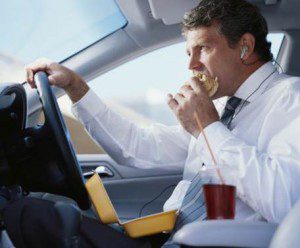Most adults who drive engage in distracted driving behaviors and readily admit doing so and know those behaviors increase the likelihood of accidents.
A new poll release by Harris Interactive/HealthDay poll, indicates that most adults who drive on a regular basis readily admit to having engaged in distracted driving behaviors. Eating and drinking lead the list at 86%, talking on non hands free cell phone 59%, using a GPS 41%, texting 37% and applying make up 14%.
“The number of drivers who engage in potentially dangerous, in some cases extremely dangerous, behaviors while driving is terrifyingly high, particularly when you remember that every 1 percent of drivers polled represents more than one-and-three-quarters of a million people,” said Humphrey Taylor, chairman of The Harris Poll.
“While we have some information on how dangerous some of these behaviors are (driving after drinking, talking on cellphones, falling asleep, texting) we can only speculate as to the numbers of accidents and deaths that are caused by the many millions of people who drive while setting their GPS, eating or drinking, surfing the Internet, watching videos, combing their hair, reading or applying makeup,” added Taylor.
Prior research has examined the dangers of distracted driving, with one 2010 study finding that texting alone was implicated in more than 16,000 deaths from 2001 to 2007. The study, published in the American Journal of Public Health, also found that auto deaths involving cell phones and texting while driving rose 28 percent between 2005 and 2008.
The survey also revealed that most drivers knew that many of these behaviors were dangerous-77% thought texting increased the odds of being in an accident and 44% believed talking on a non-hands free cell phone also increased the chances of being involved in an accident -yet continued to engage in them anyway.
This is not the first time that research has shown this apparent disconnect.
 Drivers routinely ignore dangers that they recognize. Traffic safety professionals believe that stricter laws, education and police enforcement are necessary to change this culture. Many also believe that since teen drivers are at the greatest risk special efforts aimed at education teens and helping them make safer decisions when it comes to driving are necessary.
Drivers routinely ignore dangers that they recognize. Traffic safety professionals believe that stricter laws, education and police enforcement are necessary to change this culture. Many also believe that since teen drivers are at the greatest risk special efforts aimed at education teens and helping them make safer decisions when it comes to driving are necessary.
EndDD.org will shortly be announcing programs for schools to combat distracted driving in all 50 states. The program will coincide with National Distracted Driving Awareness Month in April 2012. EndDD.org will be training speakers and providing tools for them to make effective presentations in schools to combat the epidemic of teen driving tragedies. Information about arranging for a presentation will be available shortly.



